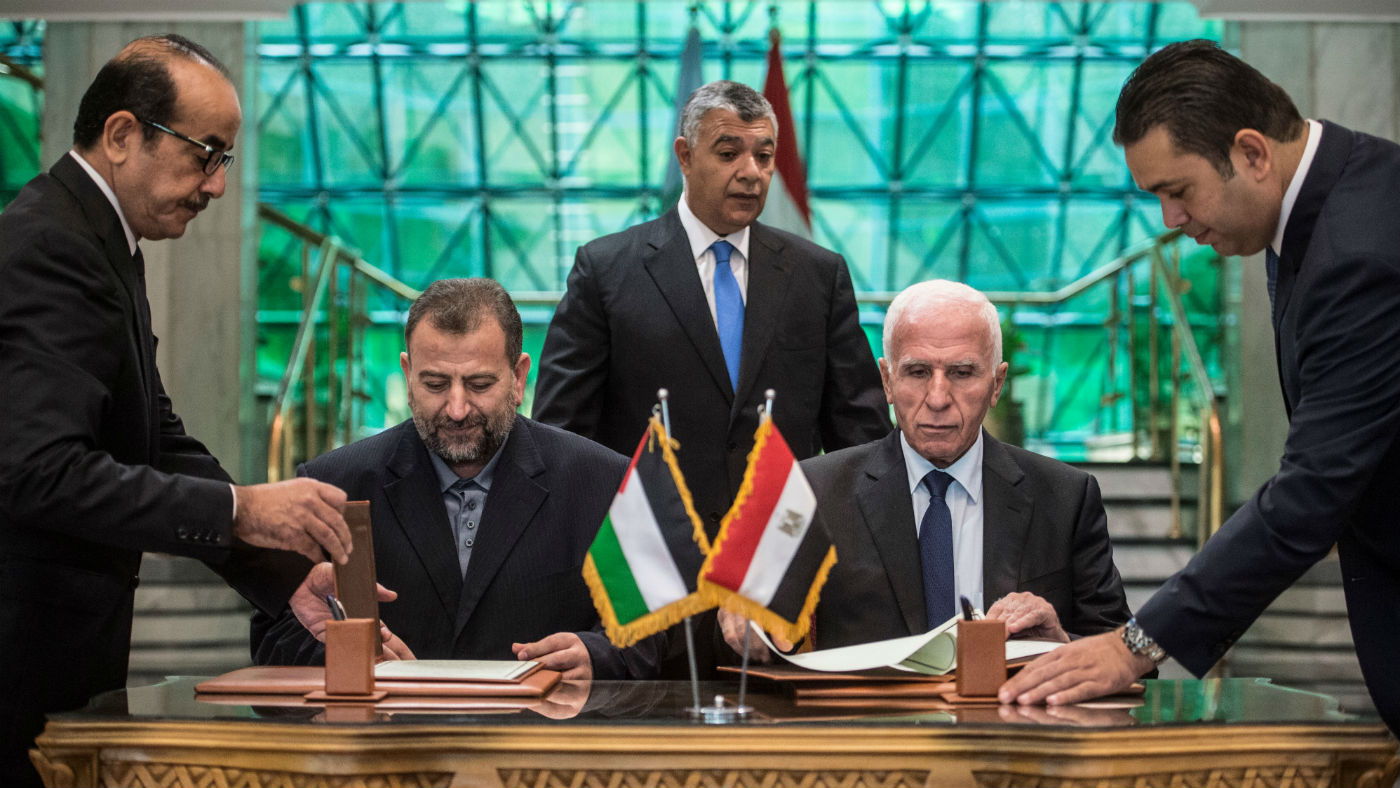Hamas and Fatah sign power-sharing deal
Agreement ends decade-long rivalry and relieves humanitarian crisis in Gaza

A free daily email with the biggest news stories of the day – and the best features from TheWeek.com
You are now subscribed
Your newsletter sign-up was successful
Palestine’s rival ruling factions have signed a reconciliation deal that ensures a unity government across Gaza and the West Bank.
Following months of reconciliation talks brokered by Egypt, representatives of Fatah and the militant group Hamas agreed a deal in Cairo described by The Independent as “the biggest step forward for intra-Palestinian relations in a decade”.
The agreement will see administrative control of the Gaza Strip handed to a Fatah-backed “government of national accord”, in exchange for lifting sanctions.
The Week
Escape your echo chamber. Get the facts behind the news, plus analysis from multiple perspectives.

Sign up for The Week's Free Newsletters
From our morning news briefing to a weekly Good News Newsletter, get the best of The Week delivered directly to your inbox.
From our morning news briefing to a weekly Good News Newsletter, get the best of The Week delivered directly to your inbox.
Palestinians in Gaza and the West Bank have been ruled separately since Hamas seized control of the coastal enclave in 2006. Deadly clashes followed in a “decade-long territorial, political and ideological split that has crippled statehood aspirations”, says The Guardian’s Peter Beaumont.
Since then, the Gaza Strip has been subjected to an Israeli blockade and Fatah strangulation of electricity and other resources, leaving its two million residents almost entirely dependent on aid.
A key component of the deal is the agreement to reopen the Rafa crossing between Gaza and Egypt, which could greatly ease Gaza’s humanitarian crisis by allowing freedom of trade and movement. It also contains a pledge to hold local and presidential elections within a year.
A new chapter?
A free daily email with the biggest news stories of the day – and the best features from TheWeek.com
Hamas spokesman Salah al-Bardawil said the deal was “a new chapter in Palestinian history”. Palestinian President Mahmoud Abbas, who plans to travel to Gaza for the first time in a decade, told the AFP news agency he welcomed the agreement and considered it “the final deal to end the division”.
The breakthrough “has been driven by the changing dynamics in the wider Middle East, which has seen Egypt move to displace Qatar and Turkey as the key broker in Palestinian affairs, with both Hamas and Fatah increasingly reliant on Cairo’s sponsorship”, says Beaumont.
However, “serious hurdles remain unresolved”, says The New York Times, “including the status of the Hamas militant wing and its estimated 25,000 fighters”.
And this is not the first time the two factions have reached an agreement: a similar deal in 2011 came to nothing. However, Palestinian officials believe the new truce has a greater chances of success because it is backed by Saudi Arabia, the US and - supposedly - Israel.
The Independent described Israel’s initial reaction to the news as “cautious” however, while France 24 quoted an Israeli government statement which said any deal must comply with “international agreements” for Hamas to disarm and recognise the state of Israel.
-
 5 blacked out cartoons about the Epstein file redactions
5 blacked out cartoons about the Epstein file redactionsCartoons Artists take on hidden identities, a censored presidential seal, and more
-
 How Democrats are turning DOJ lemons into partisan lemonade
How Democrats are turning DOJ lemons into partisan lemonadeTODAY’S BIG QUESTION As the Trump administration continues to try — and fail — at indicting its political enemies, Democratic lawmakers have begun seizing the moment for themselves
-
 ICE’s new targets post-Minnesota retreat
ICE’s new targets post-Minnesota retreatIn the Spotlight Several cities are reportedly on ICE’s list for immigration crackdowns
-
 Epstein files topple law CEO, roil UK government
Epstein files topple law CEO, roil UK governmentSpeed Read Peter Mandelson, Britain’s former ambassador to the US, is caught up in the scandal
-
 Iran and US prepare to meet after skirmishes
Iran and US prepare to meet after skirmishesSpeed Read The incident comes amid heightened tensions in the Middle East
-
 Israel retrieves final hostage’s body from Gaza
Israel retrieves final hostage’s body from GazaSpeed Read The 24-year-old police officer was killed during the initial Hamas attack
-
 China’s Xi targets top general in growing purge
China’s Xi targets top general in growing purgeSpeed Read Zhang Youxia is being investigated over ‘grave violations’ of the law
-
 Panama and Canada are negotiating over a crucial copper mine
Panama and Canada are negotiating over a crucial copper mineIn the Spotlight Panama is set to make a final decision on the mine this summer
-
 Why Greenland’s natural resources are nearly impossible to mine
Why Greenland’s natural resources are nearly impossible to mineThe Explainer The country’s natural landscape makes the task extremely difficult
-
 Iran cuts internet as protests escalate
Iran cuts internet as protests escalateSpeed Reada Government buildings across the country have been set on fire
-
 US nabs ‘shadow’ tanker claimed by Russia
US nabs ‘shadow’ tanker claimed by RussiaSpeed Read The ship was one of two vessels seized by the US military